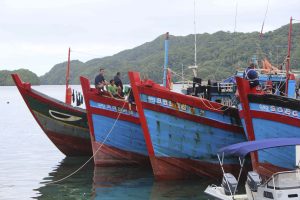The challenge of achieving sustainable ocean governance is growing in the 21st century, as the negative impacts of environmental destruction, over-exploitation, and climate change place a high degree of stress on marine ecosystems.
The framework convention for ocean governance, the United Nations Convention on the Law of the Sea (UNCLOS), was negotiated in the 1970s and ‘80s. At the time, its provisions on environmental protection, common resource ownership, and the 200 nautical mile Exclusive Economic Zone (EEZ) were novel and radical additions to global commons governance. The so-called “Constitution for the Oceans” established the basic rights and obligations of different groups in the international community, including coastal states, flag states, port states, and landlocked states. UNCLOS covers all major ocean activities, and divides ocean space into global commons and national zones of control. The negotiation and entry into force of UNCLOS represented a major accomplishment for the international community, and the larger project of global governance. The principles, norms, rights, and duties enshrined in UNCLOS serve as a guide for the collective management of common resources by states.
Now, some 40 years after the UNCLOS negotiations ended, the world has become significantly more dynamic in terms of the pace and scale of ecosystem change, the increasing demand for marine resources, and the ever-evolving competition between great powers, all of which are both maritime and coastal states. Can UNCLOS – an institution designed in another era, and with serious implementation challenges – promote conservation and sustainability in this changed and changing world?
The western and central Pacific Ocean provides an important test case for this question, offering lessons through both its successes and weaknesses in the face of climate change, intensifying resource extraction, and geopolitical pressure. This region is home to some of the most important and lucrative global stocks of tuna, which migrate through both the EEZs of small island states and the high seas. The potential for unsustainable exploitation is high in a region where distances are vast, enforcement resources are limited, and the economic stakes are substantial.
UNCLOS gives coastal states such as the Pacific Small Island Developing States (PSIDS) the exclusive right to explore, exploit, control, and manage the living resources (fish) in their 200 nautical mile EEZs. Foreign fishers must receive permission, typically through a license or permit, to access EEZ fisheries. Because the PSIDS do not have the capacity to fully exploit their valuable EEZ fisheries, they sell licenses to foreign long-distance fishers, most of whom come from China, South Korea, Japan, Spain, and Taiwan. The PSIDS have strong incentives to ensure that their EEZ fisheries are exploited sustainably: Access fees constitute a significant portion of their annual revenue, and the marine environment is connected to important parts of their cultural identity.
The PSIDS have developed unique strategies and approaches, operating within the framework of UNCLOS, to strengthen marine resource management in the western and central Pacific. Their coherence and cooperation as a region, in terms of interests, institutions, and strategy, strengthens the normative and practical power of the the Western and Central Pacific Fisheries Commission (WCPFC) to regulate fisheries for conservation and sustainability.































